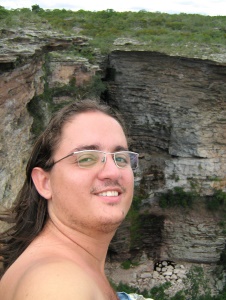Isaac Trinidade Santos

PhD Student
My name is Isaac Trindade Santos, I have an undergrad degree in Fisheries Engineering (2008 – 2015) from the Federal University of Sergipe – Brazil. My undergrad research was based on the “Analysis of reproductive patterns of fishes from three Large Marine Ecosystems”. During my undergrad I also had a scholarship provided by the Science without Borders program to work during one year with research at the University of British Columbia (2012). I had opportunity to work with the reconstruction of the marine fisheries catches statistics for Brazil and Cape Verde from 1950 to 2010 (two chapters from the book: Global Atlas of Marine Fisheries: A Critical Appraisal of Catches and Ecosystem Impacts, ISBN: 9781610917698).
The reason why I chose a Fisheries Engineering degree was because I wanted to work with natural resources management. I was concerned with the way we have been consuming the natural resources in order to maintain our way of life. The question that I wanted to answer was: how are we affecting the ecosystems across the globe? By doing Fisheries Engineering I had the opportunity to learn how to promote sustainable fisheries management and also how to develop and work with sustainable aquaculture farms (fish, shrimp, prawn, and oyster).
I also completed a master’s degree in Ecology and Conservation at the Federal University of Sergipe – Brazil (2015 – 2017). During this period I had a unique opportunity to learn how to measure multiple dimensions of biodiversity. Biodiversity is composed by three facets: taxonomic diversity (species richness), functional diversity (the role of each species for the ecosystem functioning) and phylogeny diversity (evolutionary relatedness among species). I worked with the patterns of freshwater biodiversity of fishes from Brazil (the greatest freshwater fish richness of the world is Brazil, with around 3400 species). I assessed the taxonomic and functional beta diversity of those species in multiple basin scales (paper in construction). For the second chapter of my master`s I assessed how environmental havoc affects patterns of biodiversity of freshwater fish species, by
“Simulating shifts in taxonomic and functional beta diversity of ray-finned fishes: Probing the Mariana disaster”.
Aims of my PhD
Currently I am a PhD student at the University of St Andrews (2017 – 2021), under the supervision of Professor Anne Magurran. The objective of my project is to assess how fisheries have been modifying the functional diversity of marine fishes by removing from the ecosystems species with different combinations of functional traits. The main points that will be explored are: (i) the hypothesis that in the most recent half century (from 1950 to 2010) of marine natural resources exploitation, catches of global marine fisheries showed an increase in functional diversity consistent with a broadening of the types of fishes harvested; (ii) an evaluation to establish which Large Marine Ecosystems (LME) show the greatest increase in catch rate; this analysis will also examine the consequences of this for the conservation of functional diversity; (iii) an assessment of the correlation between latitudinal gradients and the functional rarity of Actinopterygii and Elasmobranchii species across all LMEs; and (iv) an evaluation of temporal turnover in marine fishes for which biomass time series exist.
My PhD is funded by: CAPES (Coordination for the Improvement of Higher Education Personnel).
Supervisor
Prof Anne Magurran (University of St. Andrews),
Research Interests
Numerical ecology, measurement of biological diversity, fisheries statistics, reproductive biology of fishes, fish populations dynamics, fisheries management, stock assessment, marine biology, sustainable aquaculture, ecology, biodiversity conservation and macroecology.